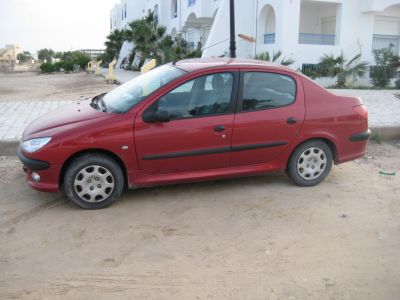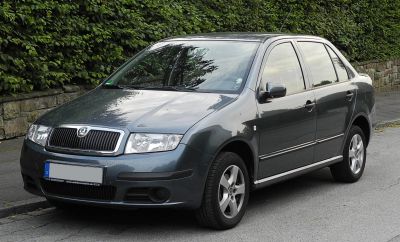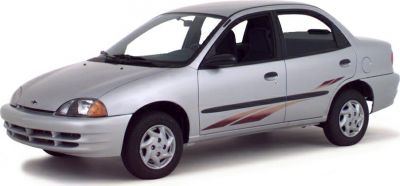 1995 Geo Metro Sedan Dimensions, Size & Specs
1995 Geo Metro Sedan Dimensions, Size & Specs
Measurements of the 1995 Geo Metro Sedan, engineered for optimal performance and comfort
| Dimensions | |
|---|---|
| Length: | 4166 mm164.0 in13.7 ft |
| Width: | 1590 mm62.6 in5.2 ft |
| Height: | 1407 mm55.4 in4.6 ft |
| Weight Specifications | |
| Curb Weight: | 826 kg1821 lbs |
| Tire Specifications | |
| Rims Size: |
|
| Tire Size: |
|
The Geo Metro Sedan, produced from 1995 to 1997, is a compact and lightweight vehicle designed to offer efficient transportation with practical dimensions and modest weight. Measuring 4166 mm (164 inches) in length, 1590 mm (62.6 inches) in width, and standing 1407 mm (55.4 inches) tall, the Metro Sedan fits comfortably in urban environments and tight parking spaces, making it an ideal choice for city commuting. With a curb weight of just 826 kg (1822 lbs), the car benefits from its lightweight construction, contributing to improved fuel economy and nimble handling. The Metro Sedan rides on 13-inch rims fitted with tires sized 125/80 R13, balancing ride comfort with efficiency. This generation of the Geo Metro is known for its simplicity and economy, reflecting an era in the mid-1990s when compact sedans served as practical daily drivers without unnecessary bulk. The Geo Metro Sedan's compact footprint combined with its low weight creates a reliable and straightforward small sedan option for drivers seeking affordability, ease of maneuvering, and good fuel efficiency.
Discover the standout features that make the 1995 Geo Metro Sedan a leader in its class
Have a question? Please check our knowledgebase first.
The 1995-1997 Geo Metro Sedan has a length of 4166 mm (164 inches), a width of 1590 mm (62.6 inches), and a height of 1407 mm (55.4 inches). These compact dimensions contribute to its ease of maneuverability and fuel efficiency. The relatively small size makes it suitable for urban driving and parking in tight spaces. Its modest width also benefits narrow parking spots and single-lane roads, making it a practical choice for city dwellers.
The curb weight of the Geo Metro Sedan during the 1995-1997 period is approximately 826 kg (1,821 lbs). This lightweight build plays a crucial role in the vehicle's fuel economy and nimble handling characteristics. A lighter car generally requires less power to move, which translates to better fuel efficiency. Additionally, the lightweight design aids in easier parking and greater responsiveness in urban traffic conditions.
The 1995-1997 Geo Metro Sedan comes equipped with 13-inch rims paired with tires sized 125/80 R13. This compact rim and tire combination complements the car's lightweight and small dimensions, contributing to its fuel-efficient and economical profile. Smaller tires also typically result in lower replacement costs and improved ride comfort on uneven city roads.
With a height of 1407 mm (55.4 inches), the Geo Metro Sedan offers a low center of gravity which enhances stability and reduces body roll during cornering. This low profile helps reduce wind resistance, improving fuel efficiency and contributing to quieter rides at higher speeds. However, it also means that interior headroom may be more compact compared to taller vehicles, which is typical for subcompact sedans focused on urban use.
Yes, the 1995-1997 Geo Metro Sedan fits well into a standard garage. Standard garages typically accommodate vehicles up to around 2.5 meters (8.2 feet) in width and over 4.8 meters (16 feet) in length comfortably. With a length of 4166 mm (13.7 feet), width of 1590 mm (5.2 feet), and height of 1407 mm (4.6 feet), the Geo Metro Sedan occupies significantly less space than these thresholds, making it an ideal candidate for a typical residential garage.
The 1995-1997 Geo Metro Sedan is largely similar in dimensions to its predecessor (early 1990s Metro models), maintaining its compact stature which was a hallmark of the Metro line. Minor tweaks in length and width may have occurred, but generally, both generations prioritize efficient small car proportions. The continuation of a lightweight and compact frame ensures consistent fuel efficiency and city-friendly driving between generations, with improvements more likely focused on mechanical and comfort features rather than size changes.
Compared to other subcompact sedans from the mid-1990s such as the Honda Civic or Toyota Tercel, the Geo Metro Sedan is generally smaller and lighter. While the Honda Civic of that era measured closer to 4.3 meters (about 169 inches) in length and weighed significantly more around 1,000–1,100 kg (2,205–2,425 lbs), the Metro’s 4166 mm length and 826 kg curb weight establish it as one of the more compact and featherlight options. This smaller size typically translates to better fuel economy and easier handling in tight urban spaces.
While specific ground clearance data is not provided, subcompact sedans like the Geo Metro typically have ground clearances around 125-140 mm (4.9-5.5 inches). This height allows for adequate clearance over common urban road obstacles such as potholes or speed bumps, while maintaining a low center of gravity for stable handling. Lower ground clearance usually sacrifices some off-road ability but enhances aerodynamics and driving stability, fitting the Metro’s city-centric design philosophy.
Although exact interior measurements for the 1995-1997 Geo Metro Sedan are limited, subcompact sedans generally provide seating for four to five passengers with moderate legroom and headroom suitable for short to moderate trips. Cargo space in the trunk is expected to be modest but adequate for typical daily groceries or light luggage, consistent with its subcompact class. The compact exterior dimensions prioritize maneuverability and fuel efficiency, which means interior space is efficiently used but remains tighter than larger vehicles.
The compact size of the 1995-1997 Geo Metro Sedan offers numerous practical advantages for city driving. Its small length (4166 mm/164 inches) and narrow width (1590 mm/62.6 inches) make parking in tight spaces much easier, whether parallel or in compact parking garages. The low curb weight (826 kg/1,821 lbs) enhances fuel efficiency, an important factor for stop-and-go urban traffic. Additionally, the car’s nimble dimensions improve maneuverability on narrow or crowded streets and reduce the stress of city driving by shrinking the vehicle’s urban footprint.
Discover similar sized cars.

| Production: | 2007-2012 |
|---|---|
| Model Year: | 2006 |
| Length: | 4188 mm164.9 in |
| Width: | 1655 mm65.2 in |
| Height: | 1452 mm57.2 in |

| Production: | 2010-2017 |
|---|---|
| Model Year: | 2010 |
| Length: | 4198 mm165.3 in |
| Width: | 1650 mm65.0 in |
| Height: | 1467 mm57.8 in |

| Production: | 1999-2004 |
|---|---|
| Model Year: | 1999 |
| Length: | 4222 mm166.2 in |
| Width: | 1646 mm64.8 in |
| Height: | 1449 mm57.0 in |

| Production: | 1998-2007 |
|---|---|
| Model Year: | 1998 |
| Length: | 4170 mm164.2 in |
| Width: | 1590 mm62.6 in |
| Height: | 1410 mm55.5 in |
